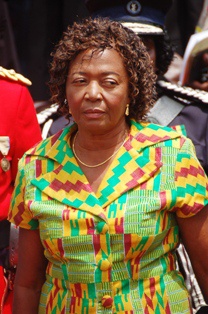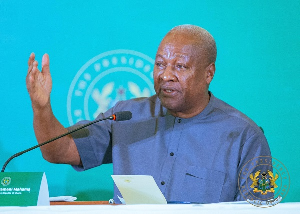Dr Ernestina Naadu Mills, former First lady, on Friday said it was estimated that 6.67 million women over the age of 15 were currently at risk of developing cervical cancer in Ghana.
“… each year in Ghana at least 3000 women are diagnosed with cervical cancer and at least 2000 women die from cervical cancer,” she said.
She said the World Health Organisation predicted that by 2015 there would be over 5000 new cases of cervical cancer in Ghana and at least 3300 cervical cancer deaths annually and stressed the need for all to do more to protect young girls from contracting the disease.
Dr Naadu Mills said this in Accra when she was presented with the Eagle Award by the Health Legend Foundation, Africa, for her contribution and role in promoting child health in Ghana.
Other awardees included former President John Agyekum Kufuor, who received the Star Award; Ambassador Jorge Lefebre, the Cuban Ambassador in Ghana, receiving the Eagle Award, while Okyeame Kwame, a Musician, was given the Humanitarian Award.
Twenty individuals and organisations were also awarded in various categories.
Dr Naadu Mills said cervical cancer was the second most common cancer in women globally, with about 500,000 new cases diagnosed each year and it was estimated that out of the number, 275,000 women died, accounting for 90 per cent of female cancers recorded.
She advocated for an aggressive campaign and immunization exercise to protect young girls against the possibility of acquiring the disease.
“We need to do more in this area and provide adequate access to screening and treatment," she said and thanked the organisation for the honour done her and other colleagues.
Dr Mills said her organisation, Foundation for Child Education, was at the forefront of addressing some of the major health challenges in the country including issues around maternal mortality and cervical cancer.
She said it was sad to note that at this day and age, women continued to die from pregnancy related and delivery complications in the country’s health facilities.
Dr Mills said the Maternal Mortality Estimation Inter-Agency Group of the United Nations estimated that 3,100 women died from pregnancy related complications in Ghana between January and December 2013.
She said even though data from the group indicated a decline by 49 per cent between 1990 and 2013, there remained a substantial amount of effort to reach the Millennium Development Goal Five (MDG5) target of 185 deaths per 100,000 live births.
“Even though serious interventions have been put in place…, the country lags behind internationally agreed targets as stated by MDG5. Poverty, illiteracy, inaccessible and unavailable hospitals, negligence on the part of health personnel and other negative customary practices are factors that have been linked to the high rate of maternal mortality in Ghana.
“I always say that strike actions by medical doctors and other health personnel also contribute to high rate of maternal mortality in the country… We need to press for better quality of service from health officials and efficient allocation of financial resources to improve maternal and new born health in Ghana,” she added.
Dr Victor Asare Bampoe, Deputy Minister of Health, in a speech read for him, said the commitment of government to the welfare of the work force of the country was non-negotiable and commended the private sector organisations for their support.
He said while effective reforms in health service provision were currently on going to improve access to healthcare, long term improvements in the health of the people hinged on tangible improvements in social infrastructure and living conditions.
“That is why government is committed to ensuring access to clean water, adequate food, housing, employment and sanitation over time.
“Government’s health financing plan currently targets the health of pregnant women, mothers and children in under-served areas. The enormous challenge can be met only through partnership arrangements at all levels,” he said.
The Deputy Minister said government could not do every alone and that private donors and non-governmental organisations had a vital contribution to make within the framework.
General News of Saturday, 25 October 2014
Source: GNA
'Cervical cancer kills 2000 women in Ghana annually'













